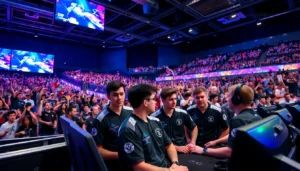Table of Contents
ToggleWhen the PlayStation 3 made its grand debut, it didn’t just bring graphics and power to the table: it also ushered in an era of immersive role-playing games that captivated players’ hearts and minds. From epic adventures to compelling narratives, PS3 RPG games offered more than just gameplay – they provided experiences that players could jump into for hours on end. If gaming is like a fine wine, PS3 RPGs are the vintage that keep getting better. So, grab your controller and let’s explore the gems of this console.
Top PS3 RPG Games to Explore

Some flagships in the PS3 RPG category deserve a spotlight. Titles like Final Fantasy XIII and The Elder Scrolls V: Skyrim stand tall, but they’re not alone in their glory.
Critical Acclaim and Popularity
Final Fantasy XIII, even though its polarizing reception, gave fans stunning visuals that could make anyone weep. With a unique paradigm shift battle system, it introduced fresh strategies, encouraging players to adapt rather than adhere to rigid tactics.
Then there’s Skyrim, a game so expansive that it feels like a second life. Players often lose track of time exploring the mountains of Tamriel or engaging in dragon battles. Its open-world design allows for endless exploration and creativity, making it a prime choice on any list of PS3 RPGs.
Other notable mentions include Mass Effect 2, which superbly combines a rich narrative with character relationships, making every choice weighty, and Ni no Kuni: Wrath of the White Witch, which combines Studio Ghibli’s enchanting art style with a whimsical take on RPG mechanics, proving that art in games is not simply decorative but integral to the experience.
Gameplay Mechanics Unique to PS3 RPGs
Gameplay mechanics in PS3 RPGs set them apart from their predecessors. Character progression feels richer than just leveling up. Games like Dark Souls brought a challenging, almost punishing style of play that required strategy and patience, rewarding players who dared enter its world. The combat systems evolved significantly, enabling players to engage with their characters more dynamically.
Another standout title, Demon’s Souls, pioneered online mechanics, allowing players to assist or hinder each other’s progress. This fascinating blend of cooperative and competitive play created a community-driven experience that few could resist. Indeed, the PS3 pushed the boundaries of what RPGs could accomplish through engaging mechanics and innovative multiplayer components.
Storytelling and Character Development in PS3 RPGs
In the realm of storytelling, PS3 RPGs excelled in weaving intricate plots that left lasting impressions. The Last of Us, while arguably blurring genre lines, showcased how powerful storytelling could elevate a game into an art form. The nuanced character development of Joel and Ellie provided emotional heft that many players still reminisce about.
Besides, titles like Persona 5 highlighted the importance of character arcs. Players didn’t just battle enemies: they built friendships, attended school, and made decisions impacting their characters’ lives. The social links within the game proved that RPGs could indeed fuse daily life with fantasy, adding layers to character interactions. The strong narratives and character-driven plots in PS3 RPGs keep players invested, feeling not merely like spectators but active participants in each story.
The Evolution of RPGs on the PS3
RPGs on the PS3 represented not just a moment in gaming history but a profound evolution of the genre. They paved the way for the modern RPG landscape we see today. The shift from isolated single-player experiences towards multiplayer functionality played a vital role in this evolution.
Multiplayer Features in PS3 RPGs
Games like Borderlands married role-playing elements with co-op gameplay, allowing friends to engage in cooperative quests. This multi-layered experience redefined how players enjoyed RPGs together, fostering camaraderie amidst the action. The introduction of online components in games like Final Fantasy XIV highlighted how RPGs could be expansive and social, forever changing the way players interact within these virtual worlds.




